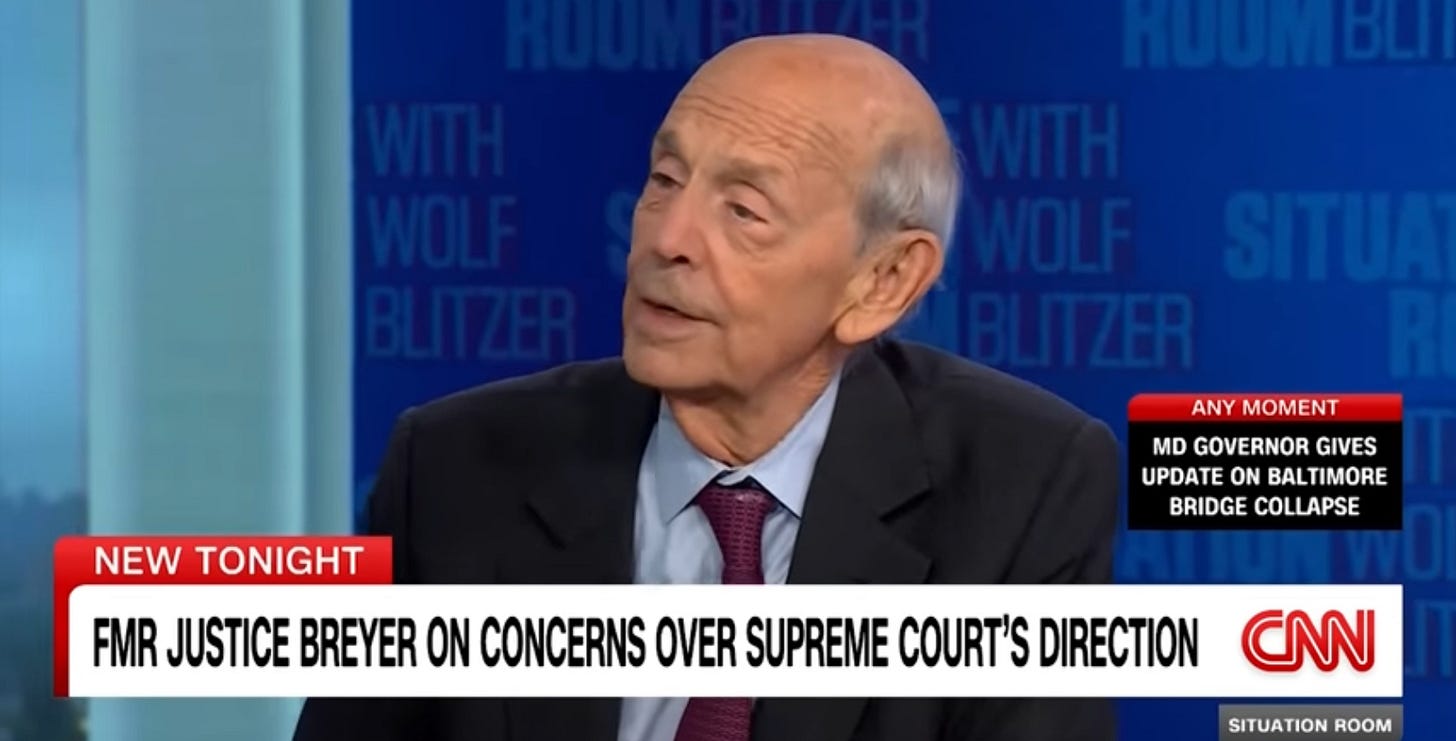Stephen Breyer’s Supreme Court Just Like That ‘Friends’ Episode Where They Overturned Roe V. Wade
Breyer’s infuriating appeal to a ‘divided’ nation.
The current Supreme Court is a corrupt institution that willingly helps foster right-wing minority rule. This radical court has overturned Roe v. Wade, denying millions of American women what was once their constitutional right, and might just help Donald Trump avoid legal accountability for his broad daylight criminal activities. This court also looks down its collective nose at basic ethical standards, which it seemingly presumes are for lesser beings.
Former Justice Stephen Breyer retired in 2022, and he has something to say about the Supreme Court. It’s just not anything useful. He writes in Wednesday’s New York Times, “The Supreme Court I Served On Was Made Up of Friends.” How lovely for him.
The photo illustration from Millie von Platen depicts the justices happily playing cards in a break room while their robes are hung up outside. They’re just folks … whose decisions have significant real-world impact. (A majority of OB-GYNs, for instance, believe that overturning Roe has led to a stark increase in maternal deaths.)
Breyer mentions February’s National Governors Association Conference, where Justices Sonia Sotomayor and Amy Coney Barrett appeared. Although one of those justices received her nomination from a criminal thug who tried to overturn the last presidential election, they nonetheless remain chummy. It’s not like Barrett heats up fish in the office microwave.
Best of all, they speak “civilly to one another while disagreeing, sometimes vigorously, about the law.” The NGA chair is Utah Governor Spencer Cox, a Republican, and the vice chair is Colorado Governor Jared Polis, a Democrat. Sotomayor and Barrett’s discussion was part of the NGA’s bipartisan initiative “Disagree Better,” which is “focused on getting leaders and the public to debate issues of concern but with civility and respect for each other.”
I’m glad we’ve mostly moved past burning crosses as a voter suppression tactic, but politely gutting the Voting Rights Act ultimately has the same result.
He goes on:
Considerable disagreements on professional matters among the Supreme Court justices, important as they are, remain professional, not personal. The members of the court can and do get along well personally. That matters.
In my tenure, this meant that we could listen to one another, which increased the chances of agreement or compromise. It means that the court will work better for the nation that it serves. And I wonder: If justices who disagree so profoundly can do so respectfully, perhaps it is possible for our politically divided country to do the same.
I believe for every drop of rain that falls
A flower grows
I believe that somewhere in the darkest night
A candle glows
I believe for everyone that goes astray
Someone will come to show the way
I believe
Breyer pours it on
Breyer recalls “being slightly surprised when, during a visit to meet with several European judges, [Sandra Day O’Connor and Ruth Bader Ginsburg] suddenly disappeared. Where had they gone?” This isn’t much of locked-door mystery. O’Connor and Ginsburg weren’t small children who’d vanished at the mall. They were adults who’d gone shopping together, maybe downed a couple shots. They wanted “suitable women’s collars for their robes,” which they found — hooray! — and Ginsburg wore them “forever after.”
This is a real passage, by the way:
At about the same time, Justice O’Connor reminded me that our chief justice, William Rehnquist, had decided that he, too, needed something distinctive on his black robe. Inspired by Gilbert and Sullivan’s “Iolanthe,” he decided to enliven it with a few gold stripes on the sleeves. Justice O’Connor found at a European bookstall a picture of Lorenzo de’ Medici wearing similar stripes. She suggested that we send it to him with a special message from her.
Rehnquist joined the majority opinion in 1986’s Bowers v. Hardwick that upheld the constitutionality of Georgia’s sodomy law, which specifically targeted homosexuals. Rehnquist didn’t deserve any flair on his robe. He definitely didn’t deserve musical theater.
“We would do things together outside class,” Breyer wrote, because he insists on working my last nerve. The Supreme Court isn’t Riverdale High — not even the sexier CW version. The court’s decisions can drastically alter real people’s lives. Back in January, the Supreme Court refused to stop the execution of Alabama death row inmate Kenneth Smith by nitrogen gas, an untested and barbaric method that the United Nations rebuked. Maybe the conservative members might’ve enjoyed capping off that day with some poker and Gilbert and Sullivan, but you’d think the supposed “liberals” might feel a little bummed.
Chief Justice Rehnquist, Justice Anthony Kennedy, Justice O’Connor and I would play bridge with friends and spouses (often changing partners).
Today, I gather that justices who do not always agree on legal results nonetheless agree to go to hockey games or play golf together. (Why hockey in Washington, D.C., where baseball, football and basketball abound? Perhaps they just like hockey.)
Bush v. Gore, Castle Rock v. Gonzales, Shelby County v. Holder, and Dobbs v. Jackson Women's Health Organization are more than just legal results. They aren’t one of Breyer’s beloved bridge matches with all the partner swapping (that’s why you have editors, New York Times).
Supreme Court country club
Breyer’s also shifting the goal posts significantly. I’ve maintained polite and courteous professional relationships with work colleagues I otherwise couldn’t stand. What Breyer’s describing is more than workplace civility. It’s a restricted club with just nine members. No wonder Breyer’s opposed to court expansion. He said in 2021 that “structural alteration motivated by the perception of political influence can only feed that perception, further eroding that trust.” The average person can plainly see that the Supreme Court is a political body, but from Breyer’s perspective, the justices are just robed gods arguing over whose crops get spared today.
He continues:
As is fairly well known, Justice Ginsburg and Justice Antonin Scalia loved opera and became great friends. They even persuaded Justice Kennedy and me to take part in a Washington Opera performance of “Die Fledermaus,” provided, of course, that we simply sat onstage on a sofa and never opened our mouths. Justice Scalia had a good musical voice, however; he, law clerks and other justices would sometimes sing at the court, joined by Chief Justice Rehnquist, as well as by a friend of Justice Scalia who was a fine pianist and loved Cole Porter.
The Supreme Court sounds like the most pretentious episode of Frasier ever written. Ginsburg, who was Jewish, seems to have made it into the secret society within the secret society, but there’s no mention of Elena Kagan or Sonia Sotomayor at these events, and they’ve been on the court for almost 15 years. I doubt Rehnquist would’ve socialized much with Ketanji Brown Jackson, either. As a Supreme Court clerk in 1952, Rehnquist drafted a memo defending Plessy v. Ferguson and racial segregation.
Breyer and Scalia would often regale high school and law school students about their experiences on the court, and it apparently wowed the audience to see that these two privileged white men remained friends despite not sharing “basic views about how to interpret difficult statutory and constitutional phrases.” Scalia wasn’t openly hostile to Breyer’s marriage, didn’t try to prevent him from holding a job, or tried to seize control of his uterus. That makes a friendship much easier. My vegan friends can overlook my carnivore habits because they’re not on the menu.
This reminds me of the white liberals and moderates who reflect fondly on the days when Republican President Ronald Reagan and Democratic House Speaker Tip O’Neill were best buds who’d regularly enjoy a drink together. But Republicans tend to like Democrats fine as long as they’re white, male, and having their asses kicked. Bill Clinton, Barack Obama, and Joe Biden tried the bipartisan bromance, but they were too successful. Republicans had to destroy them, regardless of any mutual fondness for Gilbert and Sullivan.
Breyer claims that “in my 28 years on the court I did not hear a voice raised in anger in that conference, nor were snide or personal remarks ever made. The discussion was professional, disagreements reflected legal differences on the merits, and the justices tried to find ways to reach court agreements.”
When a radical MAGA majority overturned Roe, ignoring decades of precedent and even their own statements at their confirmation hearings, maybe Breyer should’ve raised his voice a little. June 24, 2022 was a Friday. Breyer probably didn’t skip the weekly happy hour. That’s the model he wants Americans to follow. I’ll pass.
Follow Stephen Robinson on Bluesky and Threads.
Subscribe to his YouTube channel for more fun content.







Shorter Breyer:
'Now, lets not bicker and argue over who took away rights from whom...'
Wow... Give me a moment to catch my breath...
... it’s just so overwhelmingly moving that the jurists enabling fascism are civil about it.